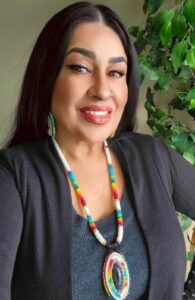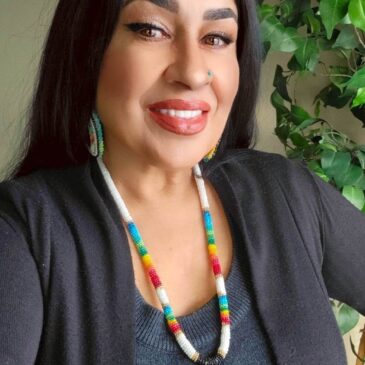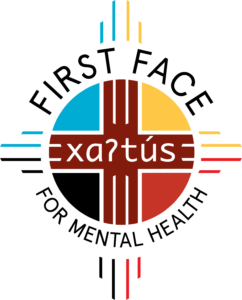Editor’s note: This op-ed was written by Martina Whelshula, PhD, a member of the Arrow Lakes Nation of the Colville Confederated Tribes in Washington State with expertise in counseling psychology and Tribal Traditional Knowledge. Dr. Whelshula discusses efforts to build Tribal communities’ collective knowledge about mental health and addiction challenges. This work is part of a broader endeavor to help these communities heal from intergenerational colonial trauma.

Six years ago on this platform, I discussed my deep commitment to helping my fellow Tribal community members heal through decolonization. The process of decolonizing is complex and transformational, especially when working with whole Tribal communities. The colonial worldview is so deeply embedded into our collective Tribal psyche that it requires a deeply reflective and critical awareness along with expanding our understanding of Indigenous worldviews. Decolonization requires us to face deep pain and suffering, while offering a new way of being in the world that is healing and liberating.
I am an enrolled member of the Arrow Lakes Nation of the Colville Confederated Tribes in Washington State. From the age of 15, I lived and studied with local Tribal Elders to learn our Tribe’s cultural teachings and practices. My grandmother was a First Language Speaker of the nsəlxcín (in-selh-cheen) language and was my first teacher in the language. I am a drummer/singer, jingle dancer, Native artist, and cultural Elder within my family and community.
My educational background is primarily in counseling psychology and Tribal Traditional Knowledge. I specialize in Indigenous psychocultural worldviews, Tribal languages/cultures, behavioral health, and Indian education. In my Traditional Knowledge doctoral program, I traveled around the world and studied with other Indigenous communities about their Traditional Knowledge. Much of my work has been grounded in comparative paradigmatic research between the Indigenous and Western scientific paradigms as it relates to education, philosophy, and psychology. My doctoral studies became the catalyst for my personal decolonizing.
I’m happy to report that since writing that op-ed six years ago, my work has expanded in important and exciting ways. Most recently, my colleagues in the Center for Indigenous Research, Collaboration, Learning, and Excellence (CIRCLE) and I have been awarded a 4-year, 4.5 million dollar Native American Research Centers for Health (NARCH) grant from the National Institutes for Health. This is CIRCLE’s third consecutive 4-year NARCH grant – representing 12 continuous years of funding! We’re proud that the NIH has recognized the promise of our work in this profound way.
CIRCLE is a collaboration between myself, the Healing Lodge of the Seven Nations, Native experts who consult with us and serve on a working group, and the Division on Addiction at Cambridge Health Alliance, particularly Drs. Debi LaPlante, Sarah Nelson, and Heather Gray. The Healing Lodge is a Native American inpatient treatment facility for adolescents struggling with drug or alcohol addiction in Spokane, Washington.
We used our first four years of NARCH funding to conduct strengths and needs assessments with seven northwest Tribal communities. We wanted to learn how these communities support their adolescents after they return home from inpatient addiction treatment. Community members acknowledged the deep wells of strength and resilience they have, despite the tremendous harm done to them since the beginning of colonization. In each community, loving, trusted adults form distributed networks of support for teens in recovery. However, these communities also saw a need to strengthen informal sources of support that can be activated whenever a teen or other community member experiences a mental health crisis or challenge.
In short, these seven Tribal communities gave us a mandate for our second four years of NARCH funding: to create xaʔtu̓s (First Face) for Mental Health. xaʔtu̓s (ha-toos) is the Salish word for First Face. It describes someone who steps forward in a situational leadership role. xaʔtu̓s for Mental Health will prepare community members to safely step forward and help someone in need – perhaps that person is feeling overwhelmed by anxiety, having suicidal thoughts, or experiencing traumatic flashbacks. The xaʔtu̓s will ensure their own safety and that of the other person, listen non-judgmentally, provide hope and reassurance, and, when necessary, serve as a bridge to formal help. But our program will do much more. By educating community members about the nature, causes, and consequences of mental health disturbances in plain, non-judgmental language, we hope to prevent some of these crises from happening in the first place.
That brings us to our most recent NARCH award. Our next four years might be the busiest yet! We will bring xaʔtu̓s for Mental Health to the seven Tribal communities who’ve supported and informed this entire process. We’ll evaluate our training at both the individual and community levels using a rigorous waitlist control design. In the process, we’ll create and staff a new, self-sustaining Research and Training Unit at the Healing Lodge. Staff members in this new Unit will learn through experience how to conduct research that answers questions about the effectiveness of xaʔtu̓s for Mental Health and other training programs, how best to support Healing Lodge residents through their inpatient stays and beyond, and more. The new Research and Training Unit will also host community members and professionals who want to be trained in xaʔtu̓s and other evidence-based programs. If you or someone you know might be interested in joining us as a Research and Training Manager, please click here to learn more about this position.
I am most excited about the approach we are introducing to the Tribes. By training individuals from high school students to Elders, Tribal Leaders, youth leaders, aunties/uncles, grandparents, and anyone who touches the lives of youth, we raise the collective knowledge and skills of a whole community to begin healing from intergenerational colonial trauma. Our evaluation of this approach will ultimately help increase xaʔtu̓s’s value and effectiveness for the Tribes.
— Martina Whelshula, PhD
Conflict of Interest Statement
Dr. Whelshula has no conflicts of interest to disclose of personal, financial, or other benefits that could be seen as influencing the content of this editorial.
What do you think? Please use the comment link below to provide feedback on this article.





